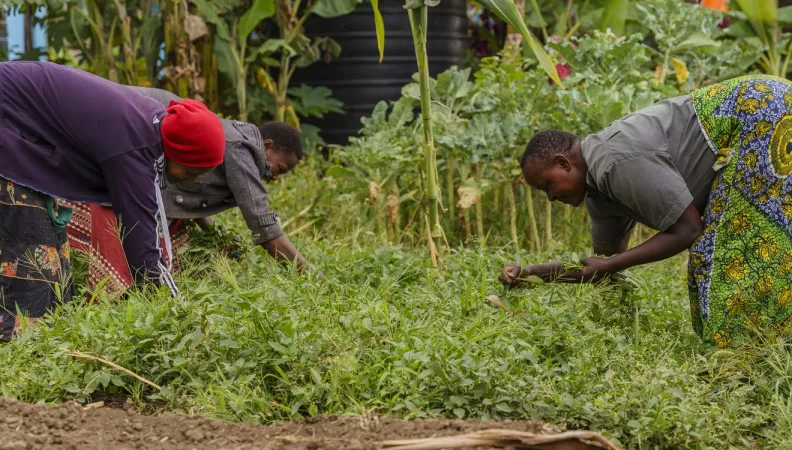Share the page
Going organic: Improving Food Quality and People’s Health in Tanzania
Published on

In Tanzania, pesticides are taking a toll on crops and the food people eat, as well as on their physical health. In a project backed by AFD, non-governmental organizations are supporting farmers in the production of organic crops, in a bid to shore up food security and improve food quality.
The Arusha region in the northeast of the country is considered one of the breadbaskets of Tanzania: agriculture represents 40% of regional GDP and employs 80% of the region’s residents. But embedded in the vibrant colors of crops are invisible agents that compromise the health benefits that such fruits and vegetables are supposed to provide. While pesticides and chemicals have increased yields and protected crops from pests, they are now used in such abundance that locals complain not only about the food’s strange taste, but of stomach aches, ulcers and abscesses.
A public health issue
A study conducted by the Tropical Pesticides Research Institute (TPRI) and the NGO RIKOLTO in Arusha found that 47.5% of the vegetable samples tested had detectable levels of pesticide residue, 74% of which was above the maximum limit recommended by the Food and Agriculture Organization. Some 63% of the samples were also contaminated with at least one bacterial strain (environmental and fecal), and reflected an overall reduction in soil quality. “I used to eat chemically treated vegetables and suffered from repeated ulcers,” says Anna Lomayani, 60, a farmer in the small village of Oldonyowas in Arusha District.
Like other farms in the region, she has switched to organic thanks to an initiative run by NGOs Iles de Paix, CARI, MVIWATA-Arusha and RECODA, to develop healthier agro-ecological practices and organic agriculture. The first phase, currently underway, has received a €500,000 grant from AFD.
“Since we switched to organic farming and no longer use any pesticides,” says Lomayani, “I have no [dietary] problems!"
Training farmers in organic techniques
Farmers and producers organized themselves into groups to improve the quality of their food, where those with experience teach others to produce organic crops and improve soil quality.
"The producers really wanted to be part of the program, especially because they realize that their soils are not as productive as they used to be, but also because they want to learn how to produce vegetables that are not harmful to them," says Sylvester Masanja, RECODA's project manager.
In one village on the slopes of Mount Meru, farmers are learning to plant vegetables using the key principles of agro-ecology, using natural pesticides. In another, farmers are learning to produce "tea manure": a 100% organic fertilizer made from cow dung.
Each farmer then undertakes to share his or her knowledge with three other people, thus ensuring wide dissemination of these new practices. In total, the project targets 1,500 producers in 10 villages, and another 30,000 indirectly.
Raising awareness
While word is spreading across villages like these, the perception of organic food is different in cities. Although 81% of the people interviewed in Arusha said they wanted to buy healthy products, most of them relied on unreliable criteria: the cleanliness of the food or the fact that it “looked nice.”
To encourage the production and consumption of healthier crops, project organizers are running a social awareness campaign that educates people about food safety and organic agriculture. They’re working with journalists to train the media and opinion makers on the issue of organic food and its health benefits.
To succeed in making organic food more popular in Tanzania, they’ll have to break down preconceived notions tied to the uniform esthetic of conventional produce, to which consumers have been accustomed. "People are reluctant to buy my carrots, because as they grow naturally, they are sometimes a bit crooked, they don't fit the standards," says Godson Mathayo Ayo, a 73-year-old farmer in Arusha.
A certification system is being developed to help sellers and consumers identify organic products, based on contracts with producers and attesting to the quality of the crop’s production. With hardly any organic market to speak of in Tanzania, farmers know they have a steep hill to climb before they see it take shape one day.
"I'm not looking for profit; I just hope that with certification, more people will realize the impact of pesticides on their health, and that they will be able to make the right choices for healthier eating!"
